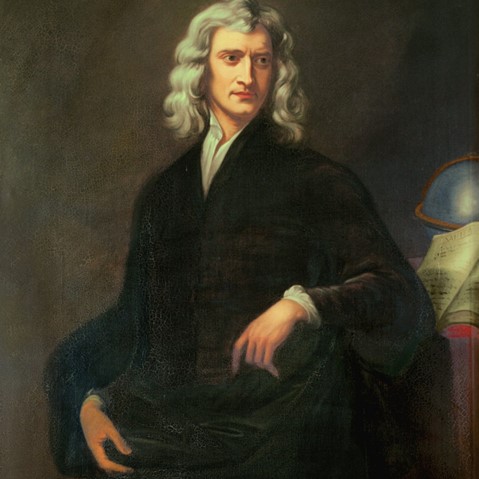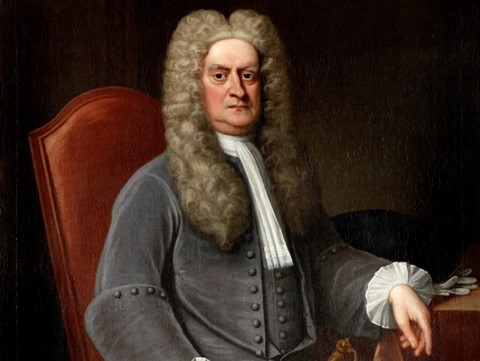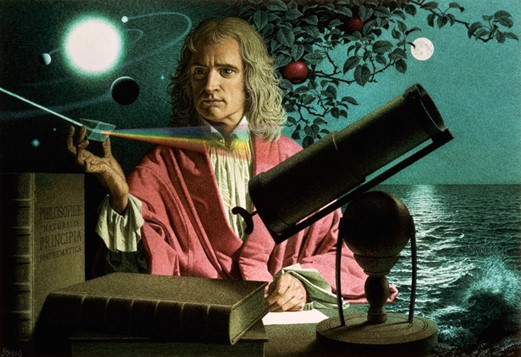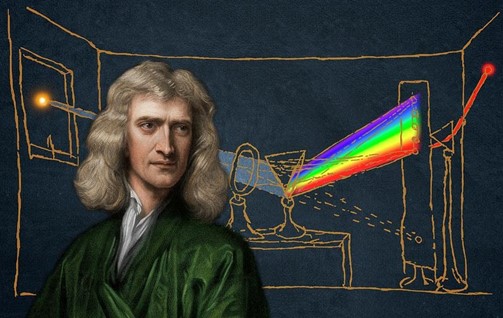1.Biography of Isaac Newton
Newton is often known for his theory of gravity and for bringing a whole new perspective on the universe. Not only that, but he also made many contributions to mechanics, optics, and mathematics.Sir Isaac Newton was born on December 25, 1642, according to the Julian calendar in Woolsthorpe, Lincolnshire, England. He was born prematurely and his mother, Hannah Ayscough, said he could fit in a cup. The sad thing is that he never saw his father's face, because his father, a farmer also named Isaac Newton, died three months before he was born. When Newton was 3 years old, he was sent to live with his grandmother after his mother married her new husband, Pastor Barnabas Smith. As a child, the scientist always hated his mother and stepfather so much that he threatened to burn down his house.
At 12, Newton entered Grantham High School, where he could study mathematics. Due to his weak physique, he was often bullied by his friends and was once punched in the stomach until he fainted. He then left school and went back to live with his once again widowed mother.
In October 1659, under the persuasion of his teacher, Newton returned to school with an excellent record at the top of the school and graduated at the age of 17. The period from 12 to 17 years old is an essential foundation for learning math and a stepping stone for the great discoveries later of the genius scientist.

Isaac Newton's IQ is 190.
Perhaps too passionate about scientific research, until his death at the age of 83, Newton still could not find himself a life partner. He was never married, and according to an autopsy, he had never had sexual intercourse with a woman. It is only known that he had a close friendship with the Swiss mathematician Nicolas Fatio de Duillier. Still, the connection also abruptly ended in the last years of his life.
In 1726, the world's greatest mathematician Newton died during his sleep in London and was buried at Westminster Abbey. As a single person, he left most of his inheritance to his relatives without any will.
2.What is the IQ of Isaac Newton?
Isaac Newton is another example of a scientist – in this case, a physicist – far ahead of his time. Although best known for his universal principles of gravity, the 17th-century thinker was also a mathematician, astronomer, and writer. His IQ is estimated at 190 to 200, depending on the measures used.IQ tests did not exist in the 17th century, and if they did, Newton certainly would not be doomed to spend 90 minutes filling in the blanks on a multiple-choice test. Instead, he would probably finish the test early and then spend the rest of his time correcting mistakes and asking harder questions. There were doubts that Newton was an intelligent man, but he also clearly displayed the other two characteristics: knowledgeable and creative.

With his wisdom Newton has contributed a lot to humanity.
He also became proficient in alchemy. Many great scientists of his time believed that any metal could be turned into gold. The Economist explains why the concept was not completely absurd in Newton's day: “Alchemical theories were not stupid. For instance, lead ore often contains silver and silver ore often contains gold, so the idea that lead 'ripens' into silver, and silver into gold, is certainly worth entertaining. The alchemists also discovered some elements, such as phosphorus.”
Furthermore, later as an adult, Newton studied economics. The author of the truly brilliant biography of Isaac Newton, James Gleick, wrote that “[h]e wrestled with issues of unformed monetary theory and international currency.” As Master of the Mint, Newton was tasked with tracking down currency counterfeiters, which he did as Gleick wrote, “with diligence and even ferocity.” When the notorious counterfeiter, William Chaloner, attacked Newton's personal integrity, he redoubled his efforts to catch him. Newton's detective work was successful as Chaloner was arrested and hanged.
More impressively, what really separated Newton from other enlighteners was his peerless creativity. He created many simple tools that did not exist before. For example, to study acceleration and change in velocity, a tool beyond basic algebra is required. That tool, called the derivative, which is the most fundamental function in calculus, did not exist in the 17th century. However, Newton invented it. The outstanding abilities and qualities of the genius scientist proved that his IQ was likely to go far beyond 190.
3.Isaac Newton’s Career and Achievements
During his time at Cambridge, Newton was strongly influenced by Euclid, although his thinking was also impacted by the schools of Roger Bacon and René Descartes. While at home due to the epidemic, Newton made important scientific discoveries, although they were not immediately published. Those who influenced the publication of Isaac Newton's works were Robert Hooke and Edmond Halley. After a debate on the subject of a particle's trajectory as it flew from space to Earth with Hooke, Newton became intrigued with using his laws of universal gravitation and mechanics in calculating Johannes Kepler' orbits.
All his life he devoted his wisdom to mankind.
Previous philosophers such as Galileo and John Philoponus used the empirical method, but Newton was the first to specifically and systematically define its use. His method balanced theory and experiment, mathematics and mechanics. He mathematized all the sciences of nature, simplified them into coherent, general, and logical steps, and created the beginning of the Age of Inference.
Newton moved to London in 1696 to take up the post of director of the Royal Mint. In 1705, Queen Anne knighted Newton, and he was later called Sir Isaac Newton. Newton's works include De Analysi, which was not published until 1711; Principia, published in 1687; Optics, published in 1704; High School Arithmetic, published in 1707; Lectiones Opticae, published in 1729; Method of Solution, published in 1736; and Geometrica Analytica in 1779. The 10 great inventions during the genius scientist's lifetime included Newton's orbital cannon, cat door, 3 laws of motion, alchemy, differential and integral, the explanation for rainbow formations, the Newtonian telescope, the perfect coin, heat loss, and the Apocalypse.
Although his political path was not bright because of his arrogant nature, all the bad things about him seemed to be forgotten when he published his research on gravity with the story of an apple falling on his head.
The principles that Newton put forth thus remain valid to this day. After his death, his methods brought about scientific achievements far greater than what he could have imagined in his lifetime. These achievements are the foundation for the technology we enjoy today.
4.10 surprising facts about Isaac Newton you probably did not know
- Newton should have been a farmer. At the age of 15-16, he was ordered by his mother to drop out of school and return to Woolsthorpe Manor to become a farmer. His mother had always thought that the family's farming tradition certainly couldn't have been more suitable for him. However, Newton, at that time, was extremely hostile to his mother and hated having to spend his life in the fields. In the end, under the persuasion of the headmaster and his impressive academic record, his mother had to give in
- As a child, Newton was quiet but an excellent aesthete, often designing and making his own sophisticated toys. Everyone loves them, especially his kite, which is both beautiful and high flying. One afternoon, he tied a pretty lantern to his kite and let it fly, which looked like a star in the sky. Everyone in the village ran out to see it and thought it was a comet. But when they found out that it was Newton's kite, everyone was full of praise
- Professor Newton's classes were attended by very few students. In 1669, he was appointed professor of mathematics at Cambridge University. Although he remained to teach at Cambridge for nearly 30 years, he showed little interest in teaching and his students as he devoted all his attention to his own research

Newton is the greatest genius ever known has an IQ of 190.
- Newton was a scientist with an extremely aggressive and competitive personality. This is especially true in the case of mathematician Gottfried Leibniz, who published calculus at the same time as Newton. To prove he was the first to research this calculation, Newton opened a direct debate with Leibniz. Many people even think that the reason he cut off contact with his close friend, the Swiss mathematician, was because she had correspondence with his rival Leibniz
- According to the famous story told by the French writer, Voltaire, while walking in the garden of the Woolsthorpe mansion, Newton was hit on the head by a falling apple and thereby invented the law of universal gravitation. In fact, at that time, Newton was sitting in the house looking out the window when he saw apples falling
- Despite his strong belief in religion, Newton vehemently opposed teachings related to demons and spirits. This seems to go against the general trend of the times. In the 17th century, most European scholars and intellectuals believed Satan to be real and considered Newton's irreverence an act of blasphemy
- Newton was obsessed with the Bible as it was the greatest passion of his life, even bigger than the sciences and research. In fact, he calculated the date of Jesus' execution, which was exactly April 3, 33 AD, and the apocalyptic time was 2060 AD
- Newton's studies of alchemy, which turned metal into gold, were kept secret throughout his life. As under the 1404 Act in England, the illegal production of gold and silver could be a felony
- Newton was a politician with few words. In 1689, he was appointed to the English parliament and performed that duty for exactly one full year. During this time, he said one and only one sentence with an usher during the lengthy proceedings: close an open, drafty window!
- The great scientist Newton is one of the world famous left-handed people like Napoleon, Da Vinci, Michelangelo, Einstein, Bill Gates, Oprah, Barack Obama, etc
Có thể bạn quan tâm